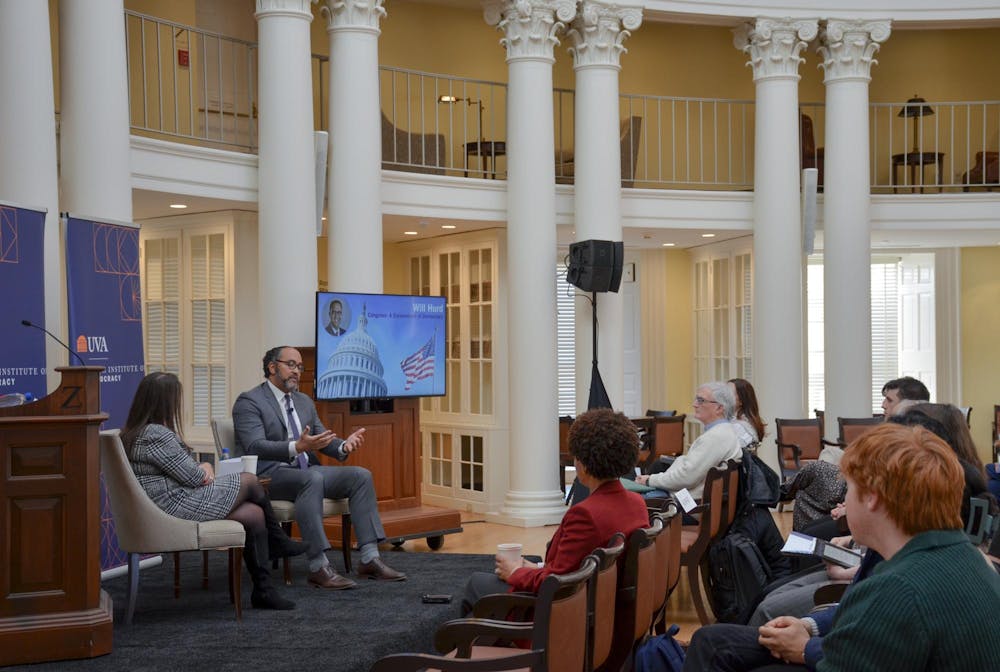“Way more unites us than divides us,” former U.S. Rep. Will Hurd (R-Texas) said at an event in the Dome Room of the Rotunda Wednesday.
The event, titled “Congress: A Cornerstone of American Democracy,” was hosted by the Karsh Institute of Democracy. Hurd was joined by Jennifer Lawless, Leone Reaves and George W. Spicer Professor of Politics, who served as a moderator. Lawless asked Hurd questions about the critical role Congress plays in addressing Americans’ needs and solicited questions from students and attendees.
Hurd represented Texas’ 23rd congressional district as a Republican from 2015 to 2021. Prior to his time in Congress, he served as a cybersecurity executive and an undercover CIA officer. Since his decision not to run for congressional reelection, Hurd has worked on artificial intelligence policy and was a 2024 presidential candidate, but dropped out of the race in late 2023.
Lawless, a Democrat and academic whose research often focuses on gender and political engagement, posed questions to Hurd, a moderate Republican with a bipartisan approach to policy making. During the event, Hurd and Lawless discussed the best ways to increase public confidence in Congress — Hurd shared his belief that bipartisan work can allow Congress to be more effective, which could in turn gain more voters’ trust.
Following the event, Lawless also emphasized the importance of bipartisan conversations.
“People from opposite sides of the aisle can have a conversation and agree on a lot of things,” Lawless said. “Now, on many policies, Representative Hurd and I totally disagree, but in terms of the way Congress functions and [its] strengths and limitations, we're in agreement. I think it's important to demonstrate that kind of civil dialogue.”
Lawless asked during the event how members of Congress balance routine tasks with big policy goals, as well as wondering if events such as this help people better understand Congress’s work and could improve its approval ratings. Hurd replied that successful campaigns require bipartisanship to deliver tangible legislative results.
“[As a country,] we've only focused on those things that divide us,” Hurd said. “[We] always focus on those things that [we] don't agree on, [but] I continued to get elected because I actually got things done.”
Lawless then asked why, despite low approval ratings for Congress as a whole, individual members continue to secure high reelection rates. Hurd explained that while Congress generally has low approval, many voters favor their personal representatives due to strong local relationships and constituent services, which often go unnoticed by the broader public.
Often these strong relationships with constituents are formed through the successful passing of laws which directly impact local voters, according to Hurd. He closed out the moderated discussion by highlighting his legislative achievements as an example of locally impactful policies — 21 pieces of legislation signed into law, which include several pieces of legislation focused on increasing border control at the Mexico-Texas border. He said that many of these initiatives came from local issues raised by his constituents, many of whom live on or near the border.
Lawless then opened the floor for audience questions. One audience member asked Hurd whether he believes the Republican Party is doing enough to better reflect America’s diversity and expand its appeal to underrepresented groups. Hurd responded that the Republican Party can succeed by focusing on issues that resonate with key groups, such as job opportunities and the economy. He also cautioned against behaviors and beliefs that risk alienating potential supporters, especially biases against minorities.
“Don't be racist, don't be misogynist, don't be a homophobe, don't be a jerk, basically, because that's something that is used against [the Republican Party] at times,” Hurd said.
Hurd’s ideas throughout the event focused on building community rather than division, and provided attendees the opportunity to hear from a more moderate politician. Following the event, Lawless said that it is important for students to engage with elected officials through events such as this, in order to understand the individuals they’re voting for and prepare for a possible career in government.
“Even at U.Va., a lot of students don't know about what Congress does, the powers that it has, or how it has to navigate the vagaries of the executive branch,” Lawless said. “These kinds of talks shed light on that.”
This event is part of an ongoing series hosted by the Karsh Institute which features leaders from both major political parties in order to facilitate political conversations. Launched in 2021, the Karsh Institute is a University-based center focused on advancing the study and practice of democracy through research, teaching and public programs.
Melody Barnes, executive director of the Karsh Institute, said that her goal with events like this one is to foster dialogue between members of Congress, experts and the public about the state of democratic institutions.
“Think about the many ways in which your life has been touched by the U.S. government,” Barnes said. “In particular, the work of Congress since you woke up this morning.”
The Karsh Institute’s next event will feature journalist Michele Norris, who will deliver the keynote address for the University’s 2025 Community MLK Celebration. The event will be followed by a discussion moderated by Barnes. It is free and open to the public and will take place Jan 30, from 6 to 7:30 p.m. at The Paramount Theater.







